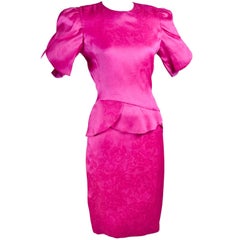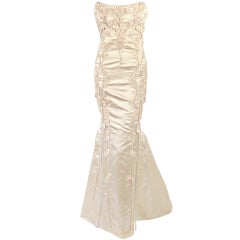Carolina Herrera Wedding Gown
Recent Sales
1990s American Cocktail Dresses
21st Century and Contemporary American Wedding Dresses
21st Century and Contemporary American Evening Gowns
21st Century and Contemporary Wedding Dresses
Carolina Herrera for sale on 1stDibs
Born into a family of wealth and sophistication in Caracas, Venezuela, but without a trace of design education, Carolina Herrera launched her eponymous fashion empire in 1981. Modeling her aesthetic on the principles of refined, simple elegance, she has gone on to defy all expectations.
Style, that elusive je ne sais quoi, is often hard-won, acquired over years of experimentation and missteps. Precious few are born with it. Carolina Herrera may well be one of them. And if she wasn’t born with it, she was most assuredly born into it, raised by wealthy and refined women in the most rarefied of circumstances back in Venezuela. Her mother and her grandmother were both perfectly put together, had their own dressmakers — even a live-in seamstress. Everything within Herrera’s reach at home was of the utmost quality. Hers was a privileged life, and no one appreciates that fact more than she.
Herrera brought that aesthetic to her first collection of clothing and accessories in 1981, encouraged by éminence grise Diana Vreeland, then the editor in chief of Vogue. Herrera was initially interested in designing textiles (she worked in a publicity role for Emilio Pucci — the iconic clothing and housewares maker — during the 1960s). It was Vreeland who planted the fashion seed. When it took root, Herrera returned to Caracas, and with the help of Guy Mellier, her personal couturier, she came up with a collection she felt was New York–ready. She never studied fashion and didn’t know how to cut or sew. “What I understood was proportion, and I had a good eye.” She knew not only what looked good on her but also on other women, too.
Herrera unveiled her first collection at the Metropolitan Club on Fifth Avenue. The fashion press was hard on her; “they didn’t have faith,” is how she explains it today. But how about the women in the audience, did they like what they saw? Herrera leans in and says with a smile, “A lot!” The buyers liked the collection, too — enough to place orders. (And they’re still placing orders.)
She quickly became synonymous with sophistication for her glamorous evening dresses, which eventually earned accolades in magazines, prime real estate in Manhattan boutique windows and a heavyweight client roster that included Jacqueline Kennedy Onassis.
As her business has evolved — in 2010 it reached $1 billion in sales — so has Herrera herself. In the 1970s and before she became a designer, she used to dance until the wee hours at Studio 54, pal around with Calvin Klein, Bianca Jagger, Halston and Andy Warhol. Through all the madness — every bit of which she enjoyed — she remained unscathed. No scandals, no gossip, no whispers. She’s been famously photographed by Robert Mapplethorpe, Arthur Elgort, Norman Parkinson, David Seidner, Mario Testino, Bruce Weber and, yes, Ron Galella. (“I’ve never said no to the paparazzi,” she explains. “I smile, let them take the picture and move on.”)
Find a collection of vintage Carolina Herrera shoes, shirts, day dresses, handbags and more on 1stDibs.
Finding the Right Evening-dresses for You
With entire museum exhibitions dedicated to examining fashion designers and their creations, we’re finally recognizing that costuming is art. Evening dresses over time have conveyed specific statements about social class, position and beliefs. Fashion is a powerful means of self-expression, and sophisticated vintage evening dresses and gowns by our favorite couturier play no small role in making us feel wonderful but, perhaps more importantly, making us feel like ourselves.
In the 16th century, dresses and gowns were so important that England's Queen Elizabeth I defined rules about what dresses women could wear — guidance included long skirts and fitted bodices. Forward-thinking designers have responded to this history.
Gabrielle “Coco” Chanel reimagined traditionally masculine garments for feminine shapes, and her elegant evening dresses and gowns promoted comfort and grace in women’s wear that had been dominated in the previous century by layers of fabric. Christian Dior's gowns celebrated luxury and femininity in the late 1940s — and gave to women the gift of glamour they’d lost in the miserable years of the war. French fashion designer Yves Saint Laurent introduced innovative and highly coveted dress designs in the 1960s while at the same time challenging sexist stereotypes about which members of society could wear tuxedos.
Works by unconventional British designer John Galliano — featured in houses like Givenchy and Dior — redefined limits that dressmakers faced in terms of material, construction and vision during the late 20th century. From his embroidered absinthe-green Oscars gown for actress Nicole Kidman to the iconic sleeveless Dior newspaper dress that Sex and the City’s Carrie Bradshaw made famous, Galliano’s intricate and multifaceted work is reliably collectible and newsworthy
Today’s designers target an increasingly broad audience with their boundary-crossing work, and their tendency to play off of each other’s ideas means that every walk down the runway is also a walk through an entire history of fashion design and dress craftsmanship.
Whether you gravitate toward backless maxi dresses or silk charmeuse gowns by Alexander McQueen or embellished, ruffled floral-print designs by Chloe or Versace, there is an extraordinary collection of vintage and designer evening dresses and gowns waiting for you on 1stDibs.

